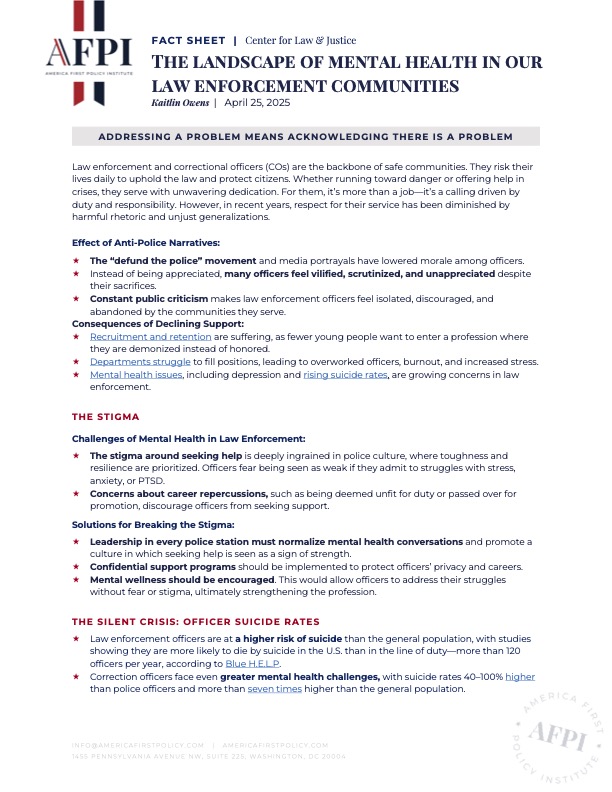The Landscape of Mental Health in Our Law Enforcement Communities
Law enforcement and correctional officers (COs) are the backbone of safe communities. They risk their lives daily to uphold the law and protect citizens. Whether running toward danger or offering help in crises, they serve with unwavering dedication. For them, it’s more than a job—it’s a calling driven by duty and responsibility. However, in recent years, respect for their service has been diminished by harmful rhetoric and unjust generalizations.
Effect of Anti-Police Narratives:
- The “defund the police” movement and media portrayals have lowered morale among officers.
- Instead of being appreciated, many officers feel vilified, scrutinized, and unappreciated despite their sacrifices.
- Constant public criticism makes law enforcement officers feel isolated, discouraged, and abandoned by the communities they serve.
Consequences of Declining Support:
- Recruitment and retention are suffering, as fewer young people want to enter a profession where they are demonized instead of honored.
- Departments struggle to fill positions, leading to overworked officers, burnout, and increased stress.
- Mental health issues, including depression and rising suicide rates, are growing concerns in law enforcement.
THE STIGMA
Challenges of Mental Health in Law Enforcement:
- The stigma around seeking help is deeply ingrained in police culture, where toughness and resilience are prioritized. Officers fear being seen as weak if they admit to struggles with stress, anxiety, or PTSD.
- Concerns about career repercussions, such as being deemed unfit for duty or passed over for promotion, discourage officers from seeking support.
Solutions for Breaking the Stigma:
- Leadership in every police station must normalize mental health conversations and promote a culture in which seeking help is seen as a sign of strength.
- Confidential support programs should be implemented to protect officers’ privacy and careers.
- Mental wellness should be encouraged. This would allow officers to address their struggles without fear or stigma, ultimately strengthening the profession.
THE SILENT CRISIS: OFFICER SUICIDE RATES
- Law enforcement officers are at a higher risk of suicide than the general population, with studies showing they are more likely to die by suicide in the U.S. than in the line of duty—more than 120 officers per year, according to Blue H.E.L.P.
- Correction officers face even greater mental health challenges, with suicide rates 40–100% higher than police officers and more than seven times higher than the general population.
- Nearly 30% of COs suffer from PTSD, yet stigma and limited resources prevent many from seeking help.
- Supporting law enforcement and COs by prioritizing mental health, restoring morale, and recognizing their sacrifices is crucial for their retention, recruitment, and overall well-being.
STATE INITIATIVES SUPPORTING OFFICER MENTAL HEALTH
While the challenges facing law enforcement are undeniable, some states have recognized the urgency of this crisis and taken meaningful steps to provide officers with the support they need.
- New Jersey: Implemented the New Jersey Resiliency Program for Law Enforcement (NJRP-LE), offering training in stress management, mental health awareness, and peer support programs like Cop 2 Cop, a confidential 24/7 helpline.
- Oklahoma: Passed SB 848, requiring mental health support programs for law enforcement, and launched the Ask for Backup program to reduce stigma around mental health treatment.
- Utah: Expanded first responder mental health services under HB 23 and HB 59, ensuring mental health screenings and access to outpatient services.
- Arkansas: Enacted Act 537, mandating counseling services for public safety employees who experience traumatic events while on duty and launching a statewide wellness initiative.
CORRECTION OFFICERS: THE OVERLOOKED CRISIS
COs face unique, often overlooked stressors. Inmate violence, understaffing, and mandatory overtime create relentless pressure, yet mental health support remains limited.
Steps to Support COs:
- Statewide Mental Health Programs: States must extend mental health initiatives to COs, ensuring they have access to peer support and counseling.
- Training for Resilience: Programs similar to NJRP-LE should be adapted for COs to provide stress management training and resilience-building resources.
- Access to Mental Health Professionals: Correctional facilities should implement programs that include in-house mental health professionals dedicated to officer well-being.
AN AMERICA FIRST APPROACH
- Accountability
- Criminals must be held accountable for their actions. Progressive criminal justice policies that coddle criminals will only make our communities less safe. Americans must insist on law and order, which begins by ensuring criminals face consequences for their criminal behavior.
- Supporting Law Enforcement and COs
- Our nation was built on the principle that no one is above the law, and law enforcement and COs uphold this. Anti-police sentiment and disregard for these officers undermine public safety.
- Strengthening the Justice System
- A fair and effective justice system is crucial for public safety. It provides law enforcement and COs with the necessary resources, ensures impartial prosecution, and prevents policies that allow repeat offenders to evade justice. It is the foundation of a secure and prosperous America.
